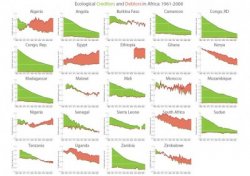Ecological Footprints Per Person
New Report Looks at Africa’s Fast-Growing Ecological Footprint
Dear Friends
Global Footprint Network congratulates African Development Bank (AfDB) and WWF for The Africa Ecological Footprint Report: Green Infrastructure for Africa’s Ecological Security. This benchmark study of the health of Africa’s ecosystems and resource trends, which has been covered by Le Monde and other media, reports a decline of nearly 50 percent in Africa’s biodiversity in the last four decades, but also offers recommendations on implementing the green economy concept through improved infrastructure investments.
The joint report, backed by Global Footprint Network data, shows that population growth and changing consumption patterns linked to increasing prosperity are causing Africa’s total Footprint to increase rapidly.
Indeed, Global Footprint Network estimates that the continent’s Ecological Footprint—that is, the population’s demand for the resources and services that Earth provides—is expected to double by 2040. Meanwhile, the ability of Africa’s ecosystems to meet these demands, or “biocapacity, ” is unlikely to increase enough to match the growing Footprint.
Global Footprint Network’s data show that if current trends continue, Africa’s resource demand will outstrip domestic availability by 2015. The continent as a whole would then be in ecological overshoot.

Ecological Footprint and biocapacity per capita trend lines, from 1961 to 2008, show an almost continuous decrease in the availability of natural resources(biocapacity) for everybody. In several countries ( Kenya, Malawi, Senegal, Uganda and Zimbabwe, for example), the size of the Footprint per person is also decreasing, largely because their ability to access resources is limited by the country’s biocapacity and because their financial constraints for importing resources from elsewhere. Without reversing these trends, progress in human development is unlikely to last.
Africa’s overall story masks the rich variety of situations and trends of individual countries. As the national Ecological Footprint of countries such as Uganda and Zimbabwe has been growing, population growth has driven down both per capita Footprint size and availability of domestic biocapacity. In short, many countries’ total consumption of ecological resources and services has been increasing while their citizens are able to use less and less resources.

